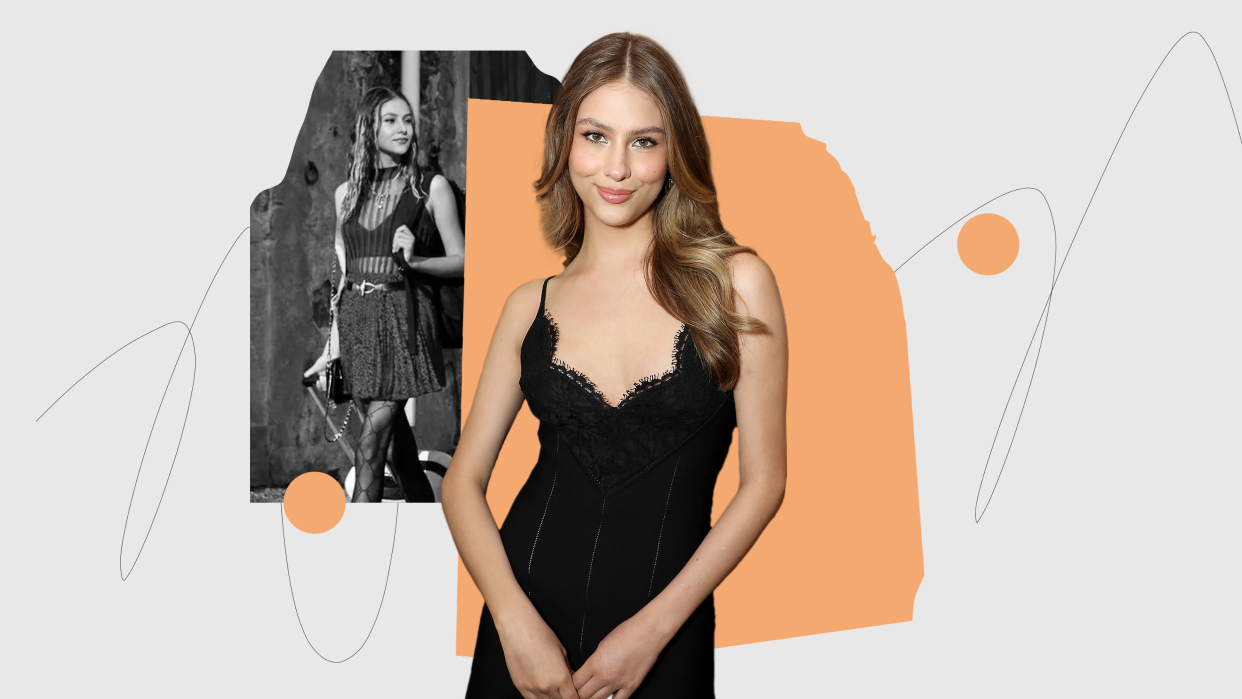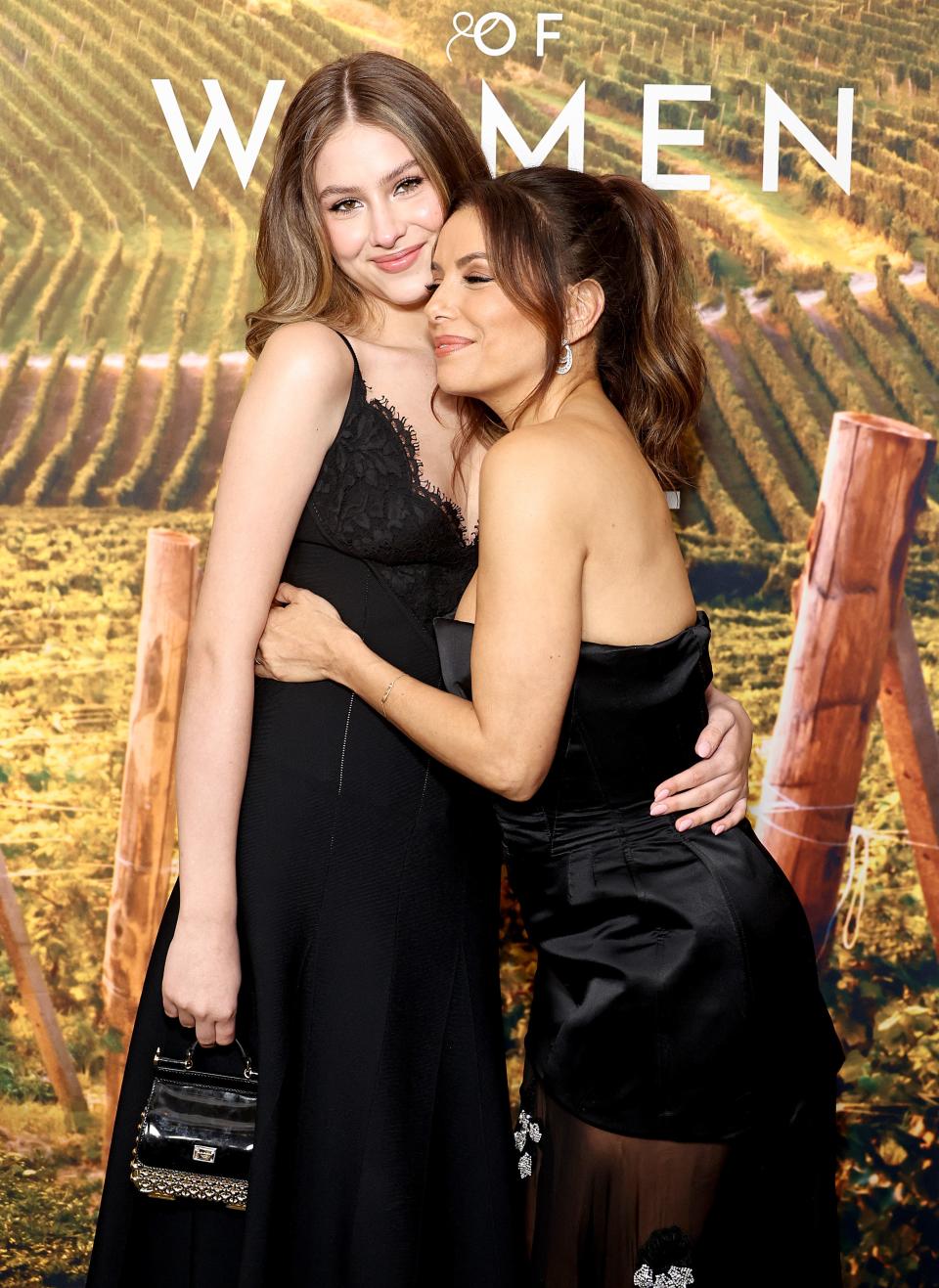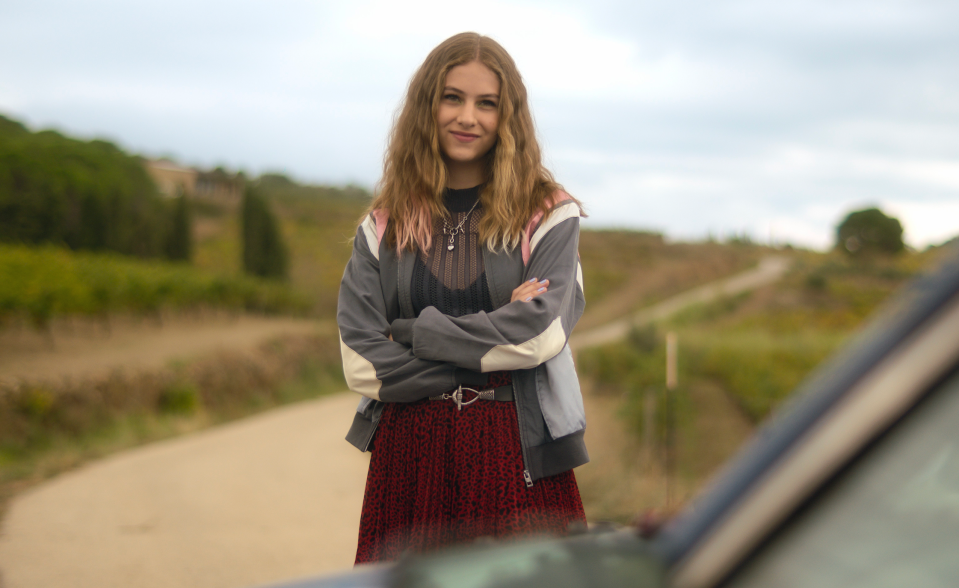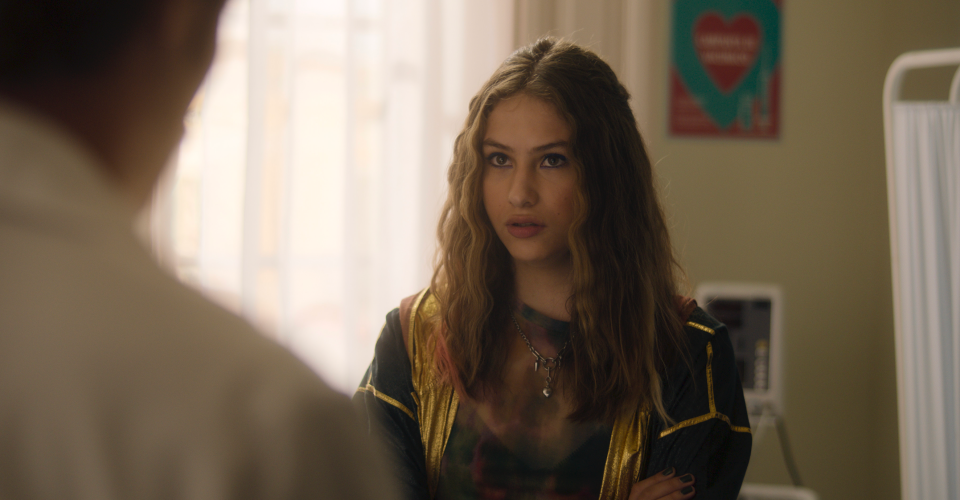Land of Women ’s Victoria Bazúa Is So Good, Eva Longoria Changed the Show for Her

Courtesy of Apple; Getty Images
Land of Women is by all accounts escapist television. The fun and frothy—yet still substantive—dramedy tells the story of three generations of women (grandmother Julia, mother Gala, and daughter Kate) as they start life anew in a small town in northern Spain amid a stunning landscape, gorgeous people, and plenty of wine and food. But as Eva Longoria’s Gala is forced to protect her family from her husband’s shady business dealings, it’s Kate, played by newcomer Victoria Bazúa, who becomes the emotional core of the Apple TV+ series.
On the whole, Kate’s concerns are that of any teen, such as navigating a relationship and figuring out her future. But as viewers learn during a flashback in the second episode, there’s another lens through which she views the world: She’s transgender. “Remember when you told us you were going to transition?” says Kate’s father, Fred, in the scene. “I just couldn’t take it all in. But your mom made it crystal clear that if I had any objections, then they were my problems, not yours.”
The way the scene is treated—as any other regular, heart-to-heart conversation and not a Very Special Episode—would have been unheard of on TV years ago. In fact, Fred only mentions it in order to explain why he wants to protect his daughter. “That’s all your mom and I ever wanted,” he says, before adding that he loves her.
It’s a sweet and moving scene that almost brings Bazúa to tears when I bring it up. Like Kate, Bazúa is transgender and very much relates to her alter ego’s journey. “I wasn’t conscious of what my own parents were going through at the time of my transition,” the Mexican model turned actor tells Glamour. “Because it’s not only a transition for us, it’s for the whole family. So getting the opportunity to have that conversation as Kate and with her father was moving.”
Getting to that scene wasn’t easy. Finding an actor who is trans and could also play Gala’s daughter while balancing the necessary comedy and drama was a tall order, for Longoria and cocreator and showrunner Ramón Campos, who also served as writer and executive producer Says Longoria, “Ramón Campos and I were so committed to being authentic and casting a transgender person, but it was hard because that age is usually when they’re transitioning or when they’re not quite transitioned.”
For Bazúa, she was very young when knew she was transgender. “When I expressed to my parents that I wanted to transition, that that’s who I was, I think I was two years old,” she says. “I was like, ‘Mommy, I’m a girl.’ Mentally, I accepted myself when I was seven; and then the whole process of uniforms, estrogen, and hormones happened around 12, before puberty. I never really went through male puberty, I guess.”
While Bazúa was perfect for the part of Kate, there was one small issue that had be figured out: “She was in Mexico, which was a problem because of the accent,” Longoria says. “A Mexican accent is very different than a Spanish accent, and then I have an American accent. We solved it by explaining where we lived in Mexico and New York; so that’s why I’m American, and my mother is from Spain. Victoria was so perfect that we changed the story for her. You couldn’t tell this was her first time acting, ever.”

Land of women, Eva Longoria, Victoria Bazua
Jamie McCarthy/Getty ImagesBazùa began learning English in kindergarten in Mexico City but perfected the language and accent when her family moved to Honduras, where she had American teachers, for two years. As they say, all the pieces fell into place.
“Like Kate, Victoria’s very confident in who she is,” Longoria says. “She wants to be an actress. She wants this life. She’s a beautiful human being, and I’m so happy that this is her first acting experience because she really learned a lot—kindness, knowing your lines, being prepared, and all of that stuff. She was just a sponge, like, ‘Okay, great. Got it, yes.’”
For Glamour’s latest edition of New Here, Bazúa opens up about how being the target of relentless bullying in her younger years empowered her to be the confident young woman she is now, the ways she bonded with Longoria, and why she feels privileged about her own transition experience.

land-of-women-kate-victoria-bazua-road.png
Courtesy of AppleGlamour: What was your audition process like?
Victoria Bazúa: Well, it’s literally my first acting gig, ever. I’ve always been into acting, television, and modeling since I was a very young girl, like seven years old. I did acting classes, and then I started modeling when I was 13. Eventually I got a casting for Kate and just really felt it. I felt so inspired by Kate. I see myself in her. I went into the audition thinking, I’m going to get it. I’m going to be Kate. I’m going to go to Spain. It’s all about manifestation. I got it, and I’m here.
Where does this confidence come from?
Bullying. It was students, teachers, moms, everyone…. I got to a point where I was like, “Am I really going to let these comments and this bullying affect me? That’s so lame. No.” I knew I was way more than those comments, so I started faking being confident. And then eventually I got to this point where I’m super comfortable with myself. I literally don’t care what people say or think about me. I just do me, and that’s enough.
You said that when you saw this casting, you were like, I have to play this girl. What was it about her?
I was 15 when the casting happened, and Kate is a teen going through puberty. In Hollywood, teens don’t usually get teenage roles because those usually go to 20-year-olds, even 30-year-olds sometimes. So I knew it was an opportunity to empower teenage actors, the Latino community, and the trans community. What I love about Kate is that she has this dark sense of humor; I am obsessed with it, because I’m like that. I love the storyline and the three generations. Plus, the show is bilingual. And honestly, I was like, Oh, it’s in Spain, hello! Vineyards, yeah! Spanish guys! Get me this job! And I got it.
In episode two Kate and her father have a very sweet heart-to-heart where he opens up about wanting to protect her, and having originally had a hard time when she transitioned. It’s not that he’s not supportive—he just wanted to be there for Kate and didn’t know how to do that properly. What did you appreciate about the way that scene was written?
Oh my God, I’m going to cry just remembering it. When I talked about my transition with my parents, it was mostly me. I wasn’t conscious of what my parents were going through. Because it’s not only a transition for us, it’s for the whole family. So getting the opportunity to have that conversation as Kate and with her father was moving, and it really touched my heart. At the time I never got the opportunity to have those conversations with my father, like, “What is going on with you? How do you feel? Tell me.” It made me notice, Wow, my parents are really going through this too. It’s one of my favorite scenes in the show.
In the third episode, when Kate is in the doctor’s office and tells him she needs a prescription for her hormone medication, it really drives home the realities of what she’s had to go through that many of us may not realize.
That scene in particular was extremely hard for me because I am really privileged. In Mexico City you can just buy hormone medication, so I never had that experience. When I was in Spain for the show, I thought, Well, I’m here; I’m going to try. I went with my mom and dad, and it was the same as usual for me—they could just give it to you. So for the scene, I was like, Okay, I’m going to put myself in Kate’s shoes and understand this is hard for her because I’ve never had that experience before. My transition was really easy, but there are trans people out there that do have it hard and do face these obstacles. I have trans friends that go through that, and they saw my transition go so smoothly. It’s terrible that we live in this time in this society where it’s so hard for us to transition when it’s not just physical, it’s mental.

land-of-women-kate-doctor.png
Courtesy of AppleYou said that your transition was a really smooth process, so is there any advice you would give to other trans kids or their families?
My family has supported me all along. It hasn’t been easy, and there have definitely been some obstacles and rocky situations. But family support is the most important and valuable thing you have. Having a support system is what got me here. That’s the key.
We see that support come into play on the show when Kate’s friend, Rosa, stands up for her when the doctor’s girlfriend goes after Kate for which bathroom she’ll use and outs her in front of everyone at the cafe. It’s by far the most upsetting scene to watch, because Kate is in shock over what’s happening.
Yeah, that was a very sad situation for Kate. She’s at a point of her life where she isn’t really comfortable standing up for herself. Rosa was there for her and said, “No, she’s a human being. She deserves respect.” That’s what I want people to take in. Our gender identity is just 1% of who we are. We deserve respect, we have dreams, we’re talented, we’re beautiful.
Sometimes I forget that I had those situations because I’m so confident now. But looking back, I was like, Damn, it is really sad and harder for people in general being attacked and not knowing what to do. I want people to know it’s not what people say about you; it’s more about what you think of yourself. It’s not easy, it takes time, and not everyone’s journey is the same. You cannot compare yourself to others and be like, “Wait, how is she my same age, and she’s so confident, so strong?” You don’t know what that person went through.
After Kate comes home following that incident, she says to her mom and grandmother, “Why is it that once someone finds out I’m trans, that’s all that they care about? Everything is always about that, and it’s not fair.” Do you feel that way? Because, to be honest, there was a part of me that didn’t want to ask you about being trans because it’s just one facet—of many—of who you are. But at the same time, the show does such a beautiful job of portraying Kate’s experience.
Yeah, it’s important to have these conversations. I’m forever grateful to Ramón Campos and his team because they were always making sure that I felt seen and that we portrayed it correctly. He gave me a lot of freedom in that scene especially because he was like, “What obstacles did you go through? What do you think trans people would want to see?” And I was like, “We’re just normal people.”
So it is unfair, and I did feel like that and do feel like that a lot of times—where people just hear or know that I’m trans and that completely vanishes who I am as a person. Again, being trans is just my gender identity. It’s not my whole personality. Victoria Bazúa is not just trans; I’m an actress, I’m a teenager, I’m a woman, I’m talented. That’s what Kate and I both want. We just want to be treated normally. We don’t want to be treated differently for being different with our gender identity. You’re not going to treat differently someone just because of where they work or what they eat.
Yes, exactly. Following that scene at the end of the episode, we see you, Eva, and Carmen scream at the top of your lungs on the top of a hill. How cathartic was that moment?
It was beautiful. We could see the whole town and the vineyards, and it was so moving to get a different perspective. That scene in particular was so freeing and inspiring to me as a human being. We see this family of three women stick up for themselves, stick together, empower, and embrace their differences. We should all do that. We should all go to the top of the hill in Catalonia and scream.
I endorse this. Okay, let’s play some rapid-fire questions. What’s your favorite way to spend a day when you’re not on set?
Eating, shopping, sightseeing, and making TikToks with Eva Longoria and Carmen Maura.
What’s your shopping weakness?
Just shopping in general. I see a store, and there’s a ghost like, “Victoria, Victoria, Victoria, Victoria.” And I’m like, “Oh my God, what’s happening?” I just go in the store, and I’m poor all of a sudden.
How did you celebrate getting the role?
I started jumping and screaming when I got the news. I was so busy getting paperwork done and getting everything ready to go to Spain, so actually, I still need to celebrate.
Did you have any rituals on set?
Eva and I would always, always, always get Jamón Serrano, a Spanish-style slow-aged ham. So eating was our ritual. We spent our free time eating.
What is your favorite part of Kate’s look?
The pink and white colors in her hair. I love that.

Speaking of hair, yours is exceptionally shiny and gorgeous. What are your favorite products?
I’m obsessed with my hair; it’s like my personality trait, okay? I love three products: Kérastase for shampooing and conditioner, Gisou for hair oils, hair perfume, the best. And then Olaplex hair protectant, chef’s kiss.
What would be your superlative on set?
Most likely to never shut the fuck up.
How do you memorize your lines?
That’s a talent that comes naturally. I just read them.
What was your favorite scene to film, other than the screaming on a hill scene?
My favorite scene to film is not on the show because it got deleted. Carmen and I were obsessed with the scene because it was so cute. So we're petitioning [production] to put the scene back in the show. I won’t say more than that.
New episodes of Land of Women stream Wednesdays on Apple TV+.
This interview has been edited for clarity.
Originally Appeared on Glamour


